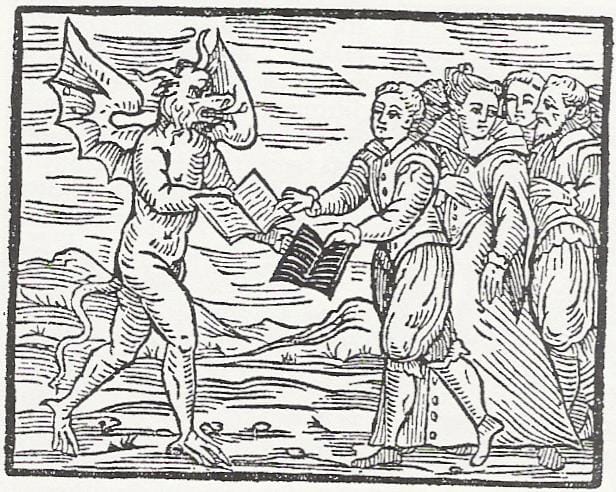dickens

No, not the famous nineteenth-century writer. This is the slang term, as in the exclamation what the dickens? Dickens is a euphemism for devil. The earliest citation in the Oxford English Dictionary is from the 1599 play King Edward IV, Part 1, commonly attributed to Thomas Heywood. The passage is from a comic scene in which the duchess is talking about hunting a deer, and the character Hobs is talking about snogging one who is dear to him:
Du[chesse]. Well met good fellow; sawst thou not the hart?
Ho[bs]. My heart? God blesse me from seeing my heart.
Du. Thy heart? the deere, man, we demaund the deere?
Hobs. Do you demaund whats deere? marie corne & cowhides, Masse a good smug Lass, well like my daughter Nell; I had rather then a bend of leather shee and I might smutch togither.
Dutchesse. Cam'st thou not downe the wood?
Hobs. Yes mistris that I did.
Dutch. And sawst thou not the Deer imbost.
Hobs. By my hood ye make mee laugh, what the dickens is it loue that makes ye prate to mee so fondly? by my fathers soule I would I had iobd faces with you.
(masse = uncertain, perhaps mercy; smug = trim, neat, smart; smutch = smooch; imbost = to drive prey on a hunt; iobd faces/jobbed faces = kissed)
While that play is the first published use of the word, Shakespeare may have beaten Heywood to the punch. He uses the word in his The Merry Wives of Windsor, where Margaret Page is trying to recall Falstaff’s name:
M.Pa. I cannot tell what (the dickens) his name is my husband had him of, what do you cal your Knights name sirrah?
Rob. Sir Iohn Falstaffe.
Ford. Sir Iohn Falstaffe.
M. Pa. He, he, I can neuer hit on’s name; there is such a league betweene my goodman, and he.
We don’t know exactly when Shakespeare wrote this play. It may have been performed as early as April 1597, but it wasn’t entered into the Stationer’s Register until 1602. But this line does not appear in either the 1602 or 1619 quarto editions. It isn’t until the 1623 First Folio that we see the dickens in the play. As usual, the quarto editions of this play are unreliable—in this case the first quarto appears to have been reconstructed from memory by an actor or someone who had seen the play—so maybe the line was used in its early performances, or maybe not. There is no way to tell for sure.
But the expression is probably not original to either Heywood or Shakespeare. It seems to have been a slang term circulating at the time.
As a diabolical euphemism, dickens shares the initial d with devil, as does the similar euphemism deuce. The name Dickin or Dickon, a diminutive of Dick, are well attested and older, so the euphemism probably assigns that name to Satan, and so it is akin to Old Nick, which dates to before 1643. Some have suggested that it is an alteration of devilkin, but there is no evidence for this.
The dickens, along with deuce, which appears by 1651, are also of note because they mark a shift in what was considered profanity, probably a result of the Protestant Reformation and nascent Puritanism. In the Elizabethan era and earlier, references to the devil are common. Shakespeare, for example, was not shy about calling the devil by his name. But by the end of the sixteenth century such euphemisms were beginning to appear, and by the mid seventeenth century such euphemisms were the norm. Shakespeare’s use of what the dickens is another example of his being attuned to the latest slang and linguistic trends, but Heywood’s use shows that Shakespeare was not unique in this regard. Other playwrights of the era were just as likely to use trendy slang and neologisms.
This shift in what is considered impolite speech also demonstrates that what we consider to be profanity is really a question of fashion. What is considered highly offensive in one era may not be so in another. Think of today’s speech where sexual terms are becoming increasingly acceptable, while the taboos are racial and misogynistic epithets; a century ago the opposite would have been the case. What the dickens is up with that?
Sources:
Green’s Dictionary of Slang, n.d., s.v. dickens, the, phr., what the dickens...? phr.
Heywood, Thomas. The First Part of King Edward the Fourth. In The First and Second Partes of King Edward the Fourth. London: I.W. for John Oxenbridge, 1599, sig. E3r. Early English Books Online (EEBO).
Hughes, Geoffrey, “Devil, The,” The Encyclopedia of Swearing, Armonk, NY: M. E. Sharpe, 2006, 118–20.
Oxford English Dictionary, third edition, June 2019, s.v. dickens, n.; June 2017, devil, n., devilkin, n.; March 2004, s.v. Old Nick, n.; second edition, 1989, s.v., deuce, n.2.
Shakespeare, William. The Merry Wives of Windsor, 3.2. In Mr. William Shakespeares Comedies, Histories, & Tragedies (First Folio). London: Isaac Jaggard and Edward Blount, 1623, 49. Folger Shakespeare Library.